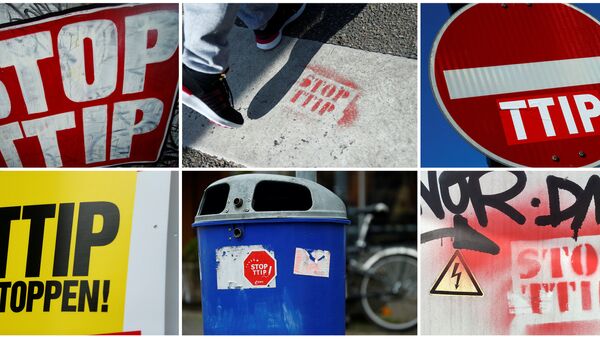The news will be a massive blow to US President Barack Obama who has made it a cornerstone of his term of office, pushing for it to be signed before he leaves the White House. It was already in trouble after the Brexit referendum, but with both Paris and Berlin weighing in, the whole deal is looking less likely to be signed.
Lessons Learned from #TTIP How to Overcome Resistance to #freetrade https://t.co/13ZOqARzQN pic.twitter.com/agOBWAQVRW
— GED_Project (@GED_Tweet) August 30, 2016
French trade minister Matthias Fekl RMC radio and BFM TV:
"What France is demanding is the pure, simple and definitive halt of these negotiations. There is no political backing by France to these negotiations anymore."
His comments come days after Germany Vice-Chancellor Sigmar Gabriel said that the TTIP talks "de facto have failed, even though nobody is really admitting it."
Kevin Smith a spokesperson for campaign group Global Justice Now told Sputnik: "The fact that TTIP has failed is testament to the hundreds of thousands of people who took to the streets to protest against it, the three million people who signed a petition calling for it to be scrapped, and the huge coalition of civil society groups, trade unions and activists who came together to stop it.
"TTIP would have resulted in a massive corporate power grab, and sovereign democracies across the EU would have been deeply compromised," he said.
Excited Bréag are headlining on Friday @Sunflower_Pub at launch of @GlobalJusticeUK #Belfast https://t.co/WI1yWCIuTK pic.twitter.com/Aee4okNUov
— LCB (@_LynseyBurrows) August 29, 2016
French President Francois Hollande put the deal further into doubt when he told diplomats Tuesday (August 30):
"These discussions cannot result in an agreement by the end of the year. The negotiations have bogged down, the positions have not been respected, the imbalance is obvious."
Deep Divisions
The TTIP would create the biggest trading zone in the world opening up the EU and US markets to each other. However, the talks have been mired in controversy because of their secretive nature, disagreements over regulatory issues — food safety and genetic modification in particular — and the contentious Investor-State Dispute Settlement (ISDS) mechanism.
One of the major stumbling blocks has been over the detail of regulatory difference between the US and the EU. A common trade agreement requires commonality of regulatory issues. None is more important than food and farming — affecting what people put in their mouths.
"TTIP has failed" — A victory for people power — our response to the #noTTIP news https://t.co/q1EwB2vGLo pic.twitter.com/anqlLHhddU
— Global Justice Now (@GlobalJusticeUK) August 29, 2016
Food regulations in the EU and the US are different, with the EU being less open to genetic modification that the US. In order to have a trade agreement, the two sides need to agree on a common regulatory framework.
In the event of a US firm not being allowed to sell its products — such as beef and pork treated with growth hormones, chicken washed in chlorine, fruit and vegetables treated with endocrine-disrupting pesticides and genetically engineered and modified foods, as are all currently allowed in the US — in the EU, the firm could sue the EU or member states.
French minister calls for halt to TTIP talks cos no political support for #TTIP in France https://t.co/kTQ4yo6Qo6 So then also reject #CETA
— GMWatch (@GMWatch) August 30, 2016
Such a situation would trigger the controversial ISDS mechanism, which critics say is a secretive trade tribunal system, separate from EU member states judiciary systems.
EU spokesman Margaritis Schinas denied the talk had broken down, saying: "The ball keeps rolling on TTIP [but that it would not] sacrifice Europe's safety, health, social and data protection standards or our cultural diversity on the altar of free trade," signaling the difficulties the negotiations were in.




